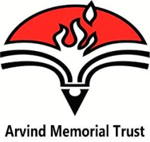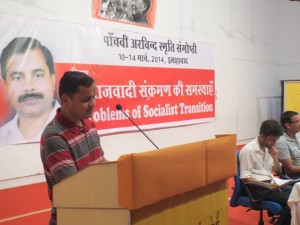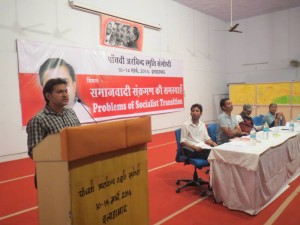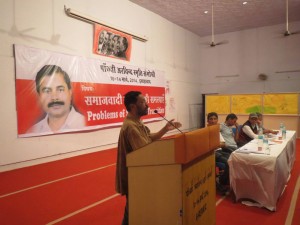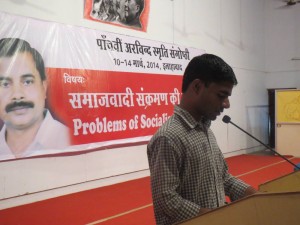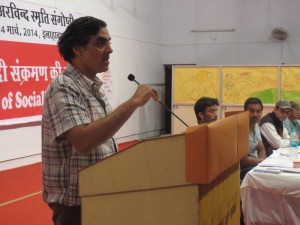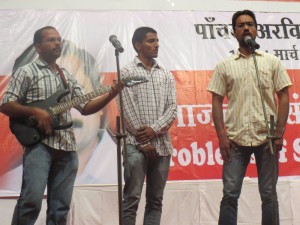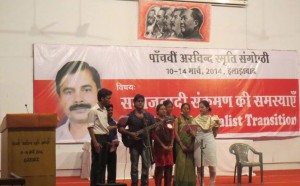Third day of seminar – Papers presented on Nepalese revolution, Great debate and Maoism
Allahabad, 12 March. The first session of the third day of the Fifth Arvind Memorial Seminar on “Problems of Socialist Transition” was centered on the problems of Nepalese Revolution and its recent developments. There was an intense discussion and debate on the reasons behind the obstacles, reversal and disintegration of the Nepalese revolutionary movement. Four papers were presented today in the seminar. There were two papers on Nepal in the first session and two on the “Great Debate” and on question of Maoism in the second session. A cultural program was presented at the end of the session to commemorate the 50th Birth Anniversary of Comrade Arvind.
The first paper of the day titled “Socialist Transition and Question of Nepalese Revolution was presented by poet and social activist Sangeet Srota from Nepal.The paper underlined the achievements of the peoples’ war in Nepal from 1996 to 2006. It was said that the end of the 240 years of monarchy was principally brought to an end because of the peoples’ war. The peoples’ movement of April 2006 was also successful because of the base provided by the peoples’ war. However, the Maoist movement in Nepal today is taking steps towards revisionism and right wing tendencies are also now becoming dominant. With participation in the peace process and becoming part of the constituent assembly and the government the Maoist movement was severed from the masses and entangled itself in the web of urban middle class, bourgeoisie, high echelons of state bureaucracy, comprador bourgeoisie, armchair intellectuals and foreign powers.The leadership of the party moved towards becoming inclined towards the government, bureaucrat-ism and comfort seeking. There was an increase in factionalism and indiscipline in the party. The size of the Central Committee started to increase but attention was not paid on the ideological and cultural education and training of the cadres. The situation of the newly formed CPN (Maoist) is more or less the same.
The second paper titled “Nepalese Revolution: Period of Reversal and Path for the Future” was presented by Anand Singh. The paper mentioned that with the defeat of the United Communist Party of Nepal (Maoist) in the election for the second constituent assembly it has become clear that the Nepalese revolution has entered the period of reversal from that of deviation and aberration. Thus, it has become imperative that there is a ruthless analysis of the reasons for reversal to bring back the Nepalese revolution on track. According to the standpoint presented in the paper, the present reversal of the Nepalese revolutionary movement is the logical culmination of the revisionist trend that sprouted a decade back within the party. The departure point of this ideological deviation was the advocacy of multi-party parliamentary system instead of the Dictatorship of the Proletariat during the period of socialist transition by Prachanda. When Prachanda was giving this revisionist line there was no struggle within the party against this formulation. Although when Prachanda elaborated on the thesis and came up with the formulation of competitive federal republic in 2008 then the Kiran faction within the party opposed it and this line had to retreat as a result. But this was achieved as a compromising formula by keeping organization in command instead of politics in command. As a result, there remained a confusion on bourgeois democracy within the party. In the guise of merging the Red Army with the regular Army the party allowed the former to disintegrate. The alternative centers of people’s power that arose during the peoples’ war instead of being consolidated were dissolved. The paper also pointed out the apparent right wing expressions in the party’s organ. The paper pointed out the past activities and recent expressions of the Kiran-Gujrel-Badal faction which broke away from the party in 2012 to form a new party. The paper stated that there is no basis to hope that this new party will be able to put the Nepalese revolution back on track. However, since the desire in the people for freedom is still alive and there is no dearth of youth committed for revolution in various organizations therefore there definitely will emerge such youth who will sum up the history of the Nepalese revolution and take the revolution forward in the right direction.
In the discussion following the paper presentation, the editor of DishaSandhan, Satyam said that the principal problem of the Nepalese revolution is ideological. The party has forgotten the lessons of Lenin on the subject of state and revolution as well as the experiences of international communist movement from Paris Commune to Chile and Indonesia and is now badly wreaked with parliamentiarist confusion.The main source of the mistake was to transform the question of tactics into one of strategy vis-à-vis participation in government and constituent assembly. After coming to power the entire practice of the leadership of UCPN (M) was reflected in its efforts to cling to power by any means. Once in a while there was a mere repetition of the threat of going back to people’s war. With every activity of the party there was a slackening of the grit of the activists and the masses as well as their revolutionary alertness. The fallout was that the party became distant from the people. Blaming the conspiracy of the reactionaries for the defeat of the party in the election to the second constituent assembly is to turn one’s face away from the real problem. Without a doubt, reactionaries would have rigged the elections but why did the CPN (M) hope that the bourgeois power would allow a free and fair election. Dattu from Aurangabad, Amendra from Lucknow, Naveen and Ajay from Delhi, Mandeep from Ghaziabad ndSukhvinder form Punjab participated in the discussion.
The contingent from Nepal through the General Secretary of Progressive Writers’ Association MitralalPanjnani, RajendraPodail and SangeetShrota agreed that the principal problem of Nepalese revolution is ideological. Commenting on the paper presented by SangeetShrotasevera speakers pointed out that the symptoms of the Nepalese revolution has been pointed out but the core problem has not been diagnosed. SangeetShrota replied that this paper was not a research paper instead it was meant for discussion. Commenting on the paper of Anand, comrade from Nepal, Rajendra commented that on the one hand it says that the peoples’ war was adventurist and on the other hand it calls the peace process as revisionist. Anand clarified that the paper does not suggest that the entire peoples’ war was adventurist but that in the initial period of the peoples’ war there was a militarist deviation. Apart from this the principal reason for the current crisis was the right wing ideological deviation since 2004.
Two papers were presented in the second session. The first paper was presented by Rajkumar from Naujawan Bharat Sabha Gurgaon. This paper delineated the world historic importance of the Great Debate which the Chinese party conducted in the 1960s against Khruschevite revisionism and which completed its 50th year. The second paper was presented by Harsh Thakor from Mumbai titled “Mao Thought or Maoism.”
Today’s session came to an end after a cultural program commemorating the 50th Birth Anniversary of Comrade Arvind. Satyam, Anand, Abhinav, Yogesh and Rajvinder spoke intimately about the various facets of Comrade Arvind’s personality. They said that Comrade Arvind lived a mere 44 years of which 24 years he sacrificed for the liberation of the proletariat. In an era where the canard against communism was at its peak, Comrade Arvind like a true warrior stood his ground on the battlefield of class struggle till the end of his last breath. He was a simple, generous and unshakeable on the communist principles. He will always live in our memories and he will always inspire us to fulfill the dreams that we forged together. This was followed by various revolutionary songs and poems in Hindi, Punjabi and Spanish performed by Dastak Cultural Forum from Punjab and Vihaan Cultural Forum from Delhi. Also SangeetShrota from Nepal performed a song in the memory of Comrade Arvind.
